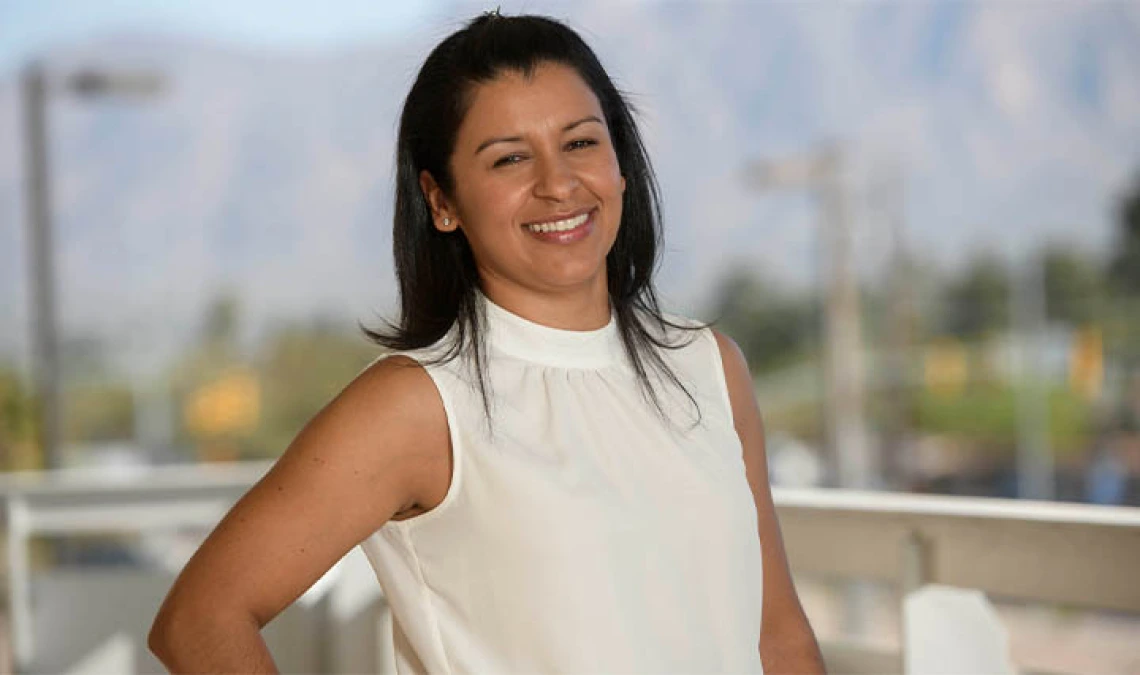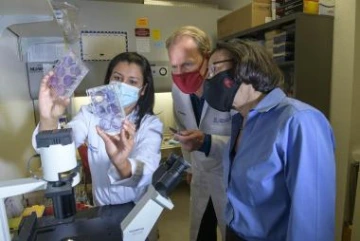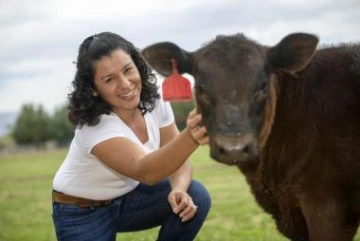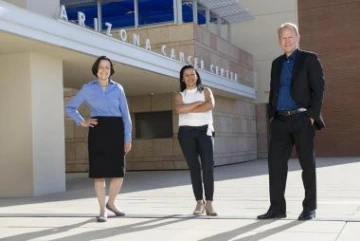Cancer Center Doctoral Student Fulfilling Lifelong Dream
Liliana Rounds discovered a potential prostate cancer biomarker during her graduate studies in the Cancer Biology Interdisciplinary Program.

Liliana Rounds, a veterinarian turned biotech industry professional turned cancer researcher, is in the home stretch of achieving her lifelong dream of earning a PhD at the University of Arizona Health Sciences.
A fifth-year student in the Cancer Biology Interdisciplinary Program at the UArizona Cancer Center, Rounds is studying a potential biomarker for prostate cancer. Her research identified a microscopic pre-malignant condition in the prostate that may be a predictor of cancer development.
Rounds uncovered the biomarker while working in the laboratory of Georg Wondrak, PhD, a research member at the

Rounds, pictured with Georg Wondrak, PhD, and Margaret Briehl, PhD, has been conducting original research to identify a potential biomarker for prostate cancer.
UArizona Cancer Center and professor of pharmacology and toxicology at the UArizona College of Pharmacy.
“Liliana’s research is very important,” Dr. Wondrak said. “The field of prostate cancer research suffers from the fact that markers of premalignancy and early disease applicable to undiagnosed patients are currently not available. This marker is truly novel and there is more exploration to be done, but it is encouraging that it can be detected in pre-malignant conditions and the early stages of prostate cancer.”
For years, Dr. Wondrak has studied an enzyme, Glyoxalase I, and its role in melanoma. He thought Rounds’ work would help advance those skin cancer investigations, but the data she generated early on indicated promise in prostate cancer.
“A real driving force for me is the idea that this might one day become something helpful for patients,” Rounds said.
An inspiring journey to a PhD
Rounds comes from humble beginnings. She and her two sisters were raised primarily by their mother in a remote farming village, population 100, outside of Tampico, a city along Mexico’s east coast. There were only two teachers at the local school, which did not offer classes beyond fifth grade.
Yet, by the time Rounds was 5 years old, she developed an affinity for learning. Eventually, the family moved to the city, where educational resources were more abundant. Rounds, always a top student in each of her classes, went on to graduate from high school.

Rounds’ love of animals, particularly cows, led her to earn a veterinary degree in her native Mexico before moving to Arizona to attend graduate school.
Forever passionate about animals, especially cows, she began college in 1998 at the Universidad Autonoma de Tamaulipas. Five years later, she graduated as valedictorian with a degree in veterinary medicine. Still, a passion for education was pushing Rounds to even bigger things.
“My big dream was to get a PhD,” she said. “My wild dreams were taking me to wild places.”
One of her former professors, Pablo Gonzalez Alanis, was pursuing a doctorate through the UArizona College of Agriculture and Life Sciences. He told her about an exchange program at UArizona, and she jumped at the opportunity to begin graduate school.
Rounds had never flown on an airplane or traveled to the U.S. when she headed to Arizona. She rented a bedroom close to campus, and vividly recalls her first night in Tucson.
“I was lying in bed that night, looking at a palm tree out the window,” she remembered. “I asked myself, ‘What am I doing here?’ I was 23 years old and so far from everything I knew at that point in my life.”
Navigating life’s winding road
The path to a master’s degree and, ultimately, a doctorate has been a winding one for Rounds, who has now been in the U.S. for 16 years. She met her husband, Matthew, in her first year at UArizona and, once Matthew graduated with a degree in engineering, a job opportunity took them to California.
Rounds began working for Abaxis Inc. (now Zoetis Inc.), a biotech company that develops, among other things, rapid diagnostic testing for pets. The job proved instrumental in leading Rounds to a career path that demanded she balance a professional career while still chasing her educational dream.
When an opportunity to work remotely for Abaxis presented itself, Rounds took advantage and returned to UArizona to

Rounds (center) with faculty mentors Dr. Briehl (left) and Dr. Wondrak (right).
continue her master’s degree. Once back in Tucson, her veterinary science and microbiology coursework led her to the laboratory of Sadhana Ravishankar, PhD, a professor at the UArizona School of Animal and Comparative Biomedical Sciences.
“We were investigating the dual effects of natural plant compounds that could serve as antimicrobials and anticarcinogens,” Rounds said. “That is where I first started getting into cancer research.”
After finishing her master’s, she joined the laboratory of V.K. Viswanathan, PhD, associate professor in the School of Animal and Comparative Biomedical Sciences and BIO5 Institute member, for her doctoral studies. But less than two years later, Rounds had to withdraw from the program.
“It was heartbreaking,” Rounds said, citing the cost of the program and the addition of her son, Christopher, to the family as primary factors in her decision to return to work full-time. “Making that decision was the worst because a PhD was my lifelong dream.”
A win-win situation
The experience she gained in Dr. Viswanathan’s lab led to a position at Roche Tissue Diagnostics, where she has worked since 2013. Currently, she is a scientist in the companion diagnostics development unit.
In 2016, she learned about Roche’s tuition reimbursement program for educational programs that were relevant to her work. Determined to take advantage of the opportunity and complete her PhD, she reached out to Dr. Wondrak.
“He was the only one willing to take me in his lab,” Rounds said. “Even though he is a small molecule-focused biochemist by training and I am a biologist by training, we quickly realized that there was some overlap in the type of molecular mechanisms that we had studied. His area of expertise and mine have become a successful collaboration.”
“We share similar energies,” Dr. Wondrak added. “Our interests and capabilities are highly compatible.”
Together, they were able to navigate work and research schedules that allowed for Rounds’ continued affiliation with Roche while she completes her PhD.
“Liliana has developed into an excellent cancer researcher,” said Margaret Briehl, PhD, associate director of cancer research career enhancement and related activities. “She is an example of the fruitful relationship that our Cancer Biology PhD program has with Roche to train cancer researchers.”
“It has been a win-win situation for me,” Rounds said. “Both opportunities have been so meaningful to me – a dream come true, actually.”






